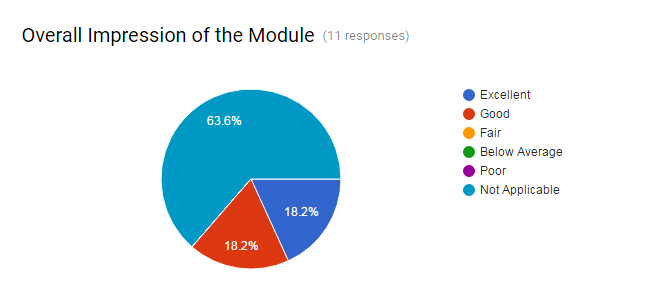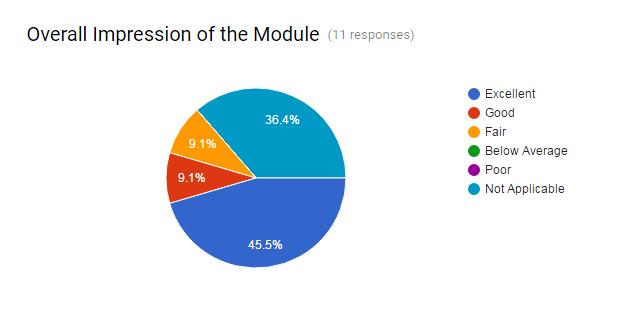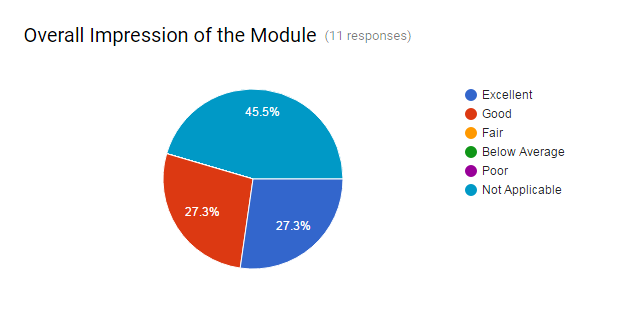ICNC offered a moderated online course on civil resistance in partnership with the International Institute for Peace at Rutgers University Graduate School, which took place from October 14, 2014 to November 21, 2014.
Click on the following links to navigate: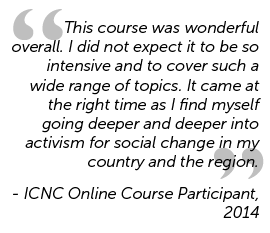
- Applications, admission and course participants
- Course moderation
- Course content
- Selected testimonials
- Useful tips from participants for course success
Applications, admission and course participants
ICNC received 86 applications and accepted 55 participants. Among those 55 participants, 23 countries of origin were represented including Israel, Pakistan, Venezuela, and Poland. The participant group was made up of activists, scholars, educators, and students.
Course facilitators included Dr. Maciej Bartkowski, Shaazka Beyerle, and Althea Middleton-Detzner.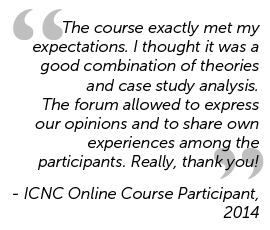
The online course consisted of an introduction module and five thematic modules. Each thematic module was released at the beginning of the week and the participants and moderators engaged in different forums of the module throughout the week. A detailed course outline is provided below. (Note: The selection of the ‘Not Applicable’ option indicates that the respondent did not participate in that particular module)
Module 1. Welcome and Introductions
Module 2. Foundation of Civil Resistance
- What civil resistance is, its dynamics, attributes, power of agency
- Explaining effectiveness of civil resistance: its record and why it was ignored in the past
Module 3. Deconstructing Misconceptions and Structural Determinism
- Common misconceptions and their harmful consequences
- Skills versus Conditions: underlying misconceptions, research findings (Freedom House study, Gaventa and Barrett), interplay between skills and conditions, Thomas Schelling quote
Module 4. Dynamics of Civil Resistance: Strategies and Tactics
- Nonviolent tactics and strategies (what they are/what is the difference between the two)
- Tools for tactical analysis
- Strategic sequencing of tactics (Nashville episode)
- Dilemma actions
- Backfire/paradox of oppression
- Defections
Module 5. Variety of topics [participants chose at least two out of six topics listed below]
- Nonviolent Resistance Against Violent Non-State Actors
- Gender Dynamics in Civil Resistance
- Violent Flank and Civil Resistance
- Unaccountable Exploitative Industry and Civil Resistance
- Grassroots Campaigns and Movements Impacting Corruption and Impunity
- Democratic Transition and Civil Resistance
5.1 Nonviolent Resistance Against Violent Non-State Actors:
If “Not Applicable” was selected it meant learners did not take part in reviewing and discussing this particular topic in Module 5, and instead chose a different one.
5.2 Gender Dynamics in Civil Resistance:
If “Not Applicable” was selected it meant learners did not take part in reviewing and discussing this particular topic in Module 5, and instead chose a different one.
5.3 Violent Flank and Civil Resistance:
If “Not Applicable” was selected it meant learners did not take part in reviewing and discussing this particular topic in Module 5, and instead chose a different one.
5.4 Unaccountable Exploitative Industry and Civil Resistance:
If “Not Applicable” was selected it meant learners did not take part in reviewing and discussing this particular topic in Module 5, and instead chose a different one.
5.5 Grassroots Campaigns and Movements Impacting Corruption and Impunity:
If “Not Applicable” was selected it meant learners did not take part in reviewing and discussing this particular topic in Module 5, and instead chose a different one.
5.6 Democratic Transition and Civil Resistance:
If “Not Applicable” was selected it meant learners did not take part in reviewing and discussing this particular topic in Module 5, and instead chose a different one.
Module 6
- Final Course Evaluations
“It was extremely knowledgeable and very concise and well organised in its structure. I could not have expected more…Very much impressed with the quality of lectures and course work and absolute brilliant administration and organisation by the ICNC Team.”
-ICNC Online Course Participant, 2014
“The course exactly met my expectations. I thought it was a good combination of theories and case study analysis. The forum allowed to express our opinions and to share own experiences among the participants. Really, thank you!!!”
-ICNC Online Course Participant, 2014
“This course was wonderful overall. I did not expect it to be intensive and to cover a wide range of topics. It came at the right time as I find myself going deeper and deeper in activism for social change in my country and region.”
-ICNC Online Course Participant, 2014
“My role models in nonviolence have been Mahatma Gandhi and Dr Martin Luther King both of whom advocated principled nonviolence yet were very strategic in the use of it. Without realizing it I had taken principled violence as the only form of violence and never considered those who use nonviolence for strategic purposes only. This understanding left me frustrated every time people turned away as I advocated for nonviolence. The course helped me get the message clearer and I will be able now to tell people correctly and draw more activists to adhere to our cause of nonviolent social change.”
-ICNC Online Course Participant, 2014
“I did not know the extent of women’s involvement in nonviolent movements. I knew it was substantial, but I had still underestimated just how powerful and effective women have been historically and presently in making nonviolence happen. Also, I was unaware of the number of instances in which folks used nonviolence, not because of an ideological commitment, but because it worked.”
-ICNC Online Course Participant, 2014
Useful tips from participants for course success
- Time management is key
- If you have internet access issues, plan work time efficiently
- Work a little everyday or pick certain days to dedicate large portions of time
- Explore the online course site in the beginning to understand all the tools
- Use your phone to read/work on the go
- Start discussions; ask questions







